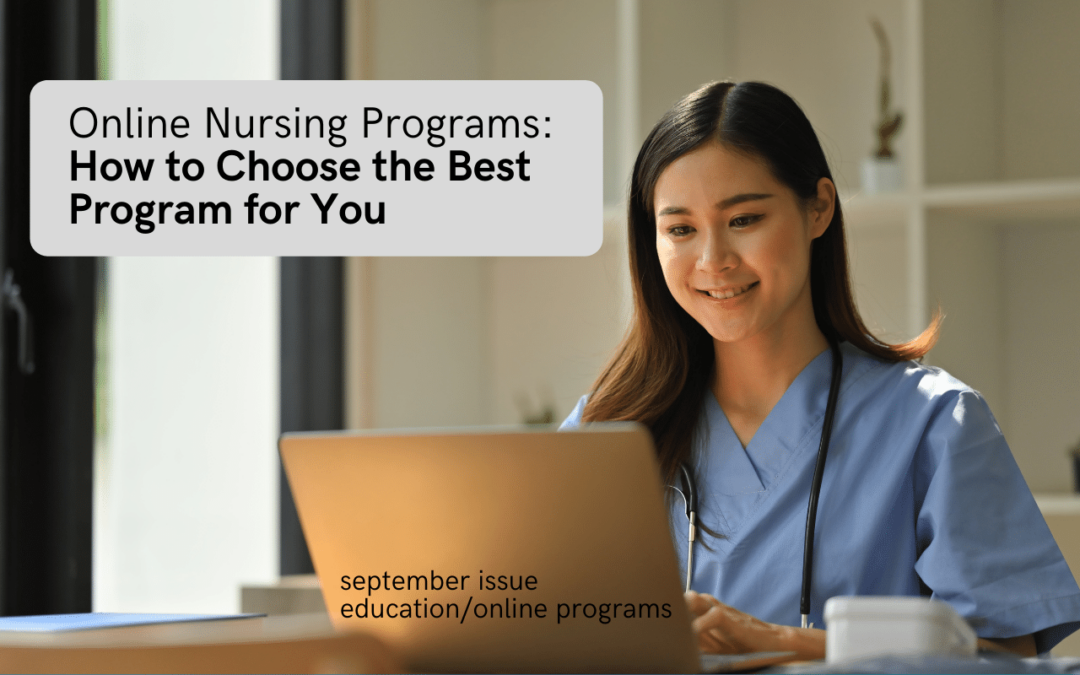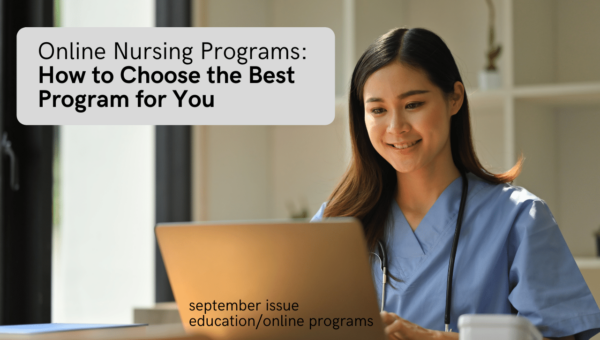
Online Nursing Programs: How to Choose the Best Program for You
For decades, online nursing education options offered nurses a different path to a nursing degree, but the choices were limited. Today’s nurses enjoy nursing degree program choices that provide variations in everything from how and when they take a course to the length of a program.
For many nurses, particularly those seeking advanced degrees, this expansion in online programs allows flexibility to balance work, school, and personal obligations. Despite the proliferation of programs, online coursework isn’t for everyone; some nurses work better in a more traditional classroom-based curriculum. The key is
assessing each program you’re interested in, your learning style, and finding a match that sets you up for success.For nurses considering this path, taking the time to find out essential details is time well invested. “There’s a growing number of online programs, so you have to know what you’re looking for,” says Patricia Bruckenthal, PhD, APRN-BC, FAAN, dean and professor at Stony Brook University School of Nursing, Stony Brook, New York. “You’re making one of the more important decisions in your life, and you have to place a high level of importance on how you’re going to fit that into your life and schedule.”
Assess the Program
Finding a program won’t be difficult, and they should be assessed carefully as any other program. “Students considering an online program should use the same criteria for selecting a program that they would use for assessing a traditional program, including choosing an accredited program, locating programs that will help you reach your professional goals, and finding schools that specialize in your primary area of interest,” says the American Association of Colleges of Nursing (AACN) president and chief executive officer Deborah Trautman, PhD, RN, FAAN.
In addition to considering the school’s reputation and accreditation, students are encouraged to use all the available information about the school and faculty members, says Bruckenthal. “Look at the level of experience the school has with online learning,” she says. “Are there any faculty who are published in online learning? Faculty who are that engaged will know students have different learning styles.”
Evaluate Your Lifestyle
Undoubtedly, online programs give a level of flexibility that makes a degree possible for nurses to juggle many obligations. “Due to the work and family responsibilities, working RNs often benefit from being able to attend class and complete coursework during non-traditional times,” says Mashawna Hamilton, DNP, RN, associate professor and associate director, RN to BSN Nursing at Ohio University, Athens, Ohio.
If students believe online learning offers flexibility, they still have to plan how to fit the class time and all the required work into their day. “It’s important to know what you’re looking for,” says Bruckenthal.
Online learning takes as much discipline as in-class courses. Look at your habits, motivations, and realities to decide if an online program will provide you with more opportunities for success or with unanticipated roadblocks.
Students working remotely must be highly motivated to complete the work when they have other obligations. There are other potential obstacles to be aware of, says Bruckenthal. Do you have quiet and sufficient study space? Do you have childcare if you need it? Is your family willing to take on additional duties such as cleaning or grocery shopping so you can carve out time for school?
Be Ready for a Challenge
Flexibility also doesn’t mean anything is simplified. “The biggest mistake a student can make is assuming that online courses are less rigorous than traditional programs,” says Trautman. “These programs take discipline, strong writing skills, and keen organizational abilities. Students in online courses are expected to answer all questions, provide regular feedback through discussion forums, and complete just as many assignments.”
If you’re looking for a program that fits your criteria, digging a little deeper into the school, the program, admission, and curriculum requirements will give the complete picture you need to make an accurate decision.
Here are some options to consider:
- What is the program cost, and how will you pay for it?
- What is the average program completion time?
- Are online students ever required to be on campus?
- What is the curriculum delivery (is it asynchronous or synchronous)?
- What do postgraduate career outcomes look like?
- What are the technology requirements?
- What happens if you need more time to complete the program?
Knowing what happens for students postgraduation—from employment to alum networking—is critical to the whole program. “Students should consider the reputation of the online programs,” says Hamilton. “In doing so, consider comments from employers of previous graduates. What is the graduate employment rate? What accolades has the program received from national agencies?”
When you find a program that fits your learning expectations, schedule, and budget, some final details need clarification before committing to a program.
Trautman recommends contacting each school to assess how the learning format, clinical experience, and academic and professional development supports offered will help you. “School advisors will know what options and assistance is available to offset costs, including scholarships and loan repayment programs,” she says. “The only way to fully know what institution-specific programs are available is to contact the nursing school.”
And when planning when you’ll have that degree in hand, remember the course schedule of each school can vary. An average program completion time can indicate the pace of courses and flexibility, but sometimes required courses are offered only once or twice a year. If you aren’t aware of the schedule, it can derail your expected graduation date. “Students should also inquire about the frequency courses are delivered, the expected time dedication for courses, and requirements for part-time and or full-time enrollment,” says Hamilton.
Evaluating Supports
During your research, find out what assistance is offered to online students. Because a program is online, it may seem more difficult to access help when you can’t just go to a physical office. “The strength of student support programs can significantly impact the student’s success during their academic journey,” says Hamilton.
Good online nursing programs will have support, including online office hours for faculty members, remote technology support, online study, social groups, and even one-on-one student support from the college. Students may want to ask about online libraries, learning labs, online writing help, skill-building webinars, wellness services, and opportunities for online student engagement as well, says Trautman.
And students also have options that are outside the campus to help them succeed in an online program, including professional nursing organizations. For example, master’s and doctoral program students can access a free membership to AACN’s Graduate Nursing Student Academy, which provides focused support opportunities for students in online and traditional programs.
For many nurses, remote degree programs open possibilities and help bring more nurses into the workforce. “Since these programs are generally directed toward individuals who are already licensed registered nurses, most students are working and trying to juggle life’s many demands,” says Trautman. “Online programs make that possible.”
Sign up now to get your free digital subscription to Minority Nurse.


